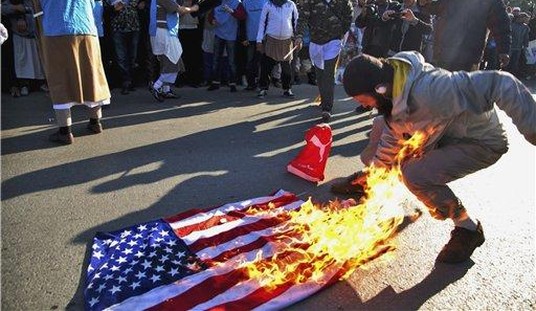“New Twitter challenge,” writer/podcaster Whitney Reynolds tweeted out last week. “Describe yourself like a male author would.” Reynolds’ challenge — which she apparently made while “ripped on Franzia” — was in response to a tweet from young adult author Gwen C. Katz. Katz’s tweet declared that “a male author is insisting that he is living proof that it’s possible for a male author to write an authentic female protagonist.” She then included an excerpt from this unnamed author’s work:
I sauntered over, certain he noticed me. I’m hard to miss, I’d like to think — a little tall (but not too tall), a nice set of curves if I do say so myself, pants so impossibly tight that if I had a credit card in my back pocket you could read the expiration date. The rest of my outfit wasn’t that remarkable, just a few old things I had lying around. You know how it is.
A male author is insisting that he is living proof that it's possible for a male author to write an authentic female protagonist.
Here's a quote from his first page. pic.twitter.com/f6d5bN2EHq
— Gwen C. Katz (@gwenckatz) March 30, 2018
new twitter challenge: describe yourself like a male author would
— Jeff Beouf (@whitneyarner) April 1, 2018
Now, this is undoubtedly a terrible piece of writing, and should not be used as evidence of anything, least of all the ability to write a convincing female protagonist. But it isn’t this author’s awful prose that prompted Reynolds’ challenge. It was the fact that it was a description — albeit a horrible one — of a woman’s physical appearance.
Feminist Twitter got it right away. The tweets came pouring in. “Her breasts entered the room before her far less interesting face,” wrote novelist Jennifer Weiner. “I had big honking teeters, just enormous bosoms, and I thought about them constantly,” tweeted Talia Lavin, a fact checker for The New Yorker. “Her dress clung to the curves of her bosom which was cupped by her bra that was under it, but over the breasts that were naked inside her clothes,” chimed in Jane Casey, an author from Ireland.
https://twitter.com/jenniferweiner/status/980839958943592450
I had big honking teeters, just enormous bosoms, and I thought about them constantly as I walked down the street, using my legs (thick, with big shapely calves), but never not thinking about my enormo honkers, https://t.co/UaCQBchchL
— Talia Lavin (@chick_in_kiev) April 1, 2018
She was forty but could have passed for a year younger with soft lipstick and some gentle mascara. Her dress clung to the curves of her bosom which was cupped by her bra that was under it, but over the breasts that were naked inside her clothes. She had a personality and eyes. https://t.co/o9UJ5QcrQM
— Jane Casey (@JaneCaseyAuthor) April 1, 2018
There’s no doubt these tweets are funny. But what’s even funnier (not so much haha funny as bang your head against the wall funny) is that this whole concept only exists because these feminists are accidentally admitting something they insist isn’t true: that men and women are inherently different.
The whole reason the unnamed male author was going on about how good he is at writing women was because of something called #OwnVoices. #OwnVoices was started by author Corinne Duyvis to recommend books with “diverse characters written by authors from that same diverse group.” In other words, the best person to write an ungendered, albino, black, physically disabled, psychic member of the ungendered-albino-black-physically-disabled-psychic fan club is an ungendered, albino, black, physically disabled, psychic member of the ungendered-albino-black-physically-disabled-psychic fan club.
The idea here is essentially that a person from a certain “group” understands that group better than someone who’s not a part of it. Whether or not this is actually true is irrelevant for our purposes, so we’ll just leave that alone and stipulate that it is true. And let’s assume — as we’re clearly meant to, based on Reynolds’ challenge — that “woman” counts as a “diverse group,” the members of which know better than others what their own experience is. This necessarily implies that men and women are inherently different. A man can’t competently write a woman because he doesn’t understand what it’s like to live inside her mind.
But, hang on, isn’t gender just a social construct? Maybe it’s only not a social construct when it offers an opportunity to say men are evil. But wouldn’t their evilness render them different? Whatever, I give up. I have more important things to do — like buying a new bra.









Join the conversation as a VIP Member